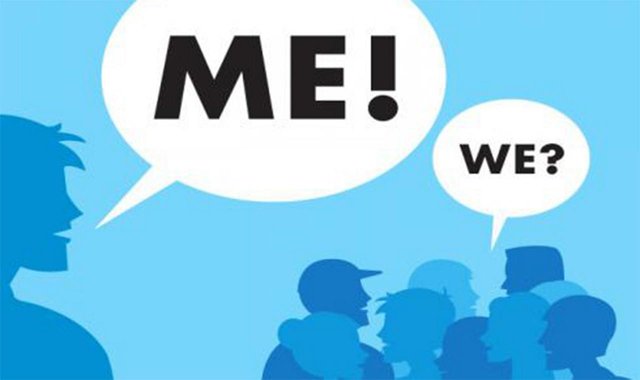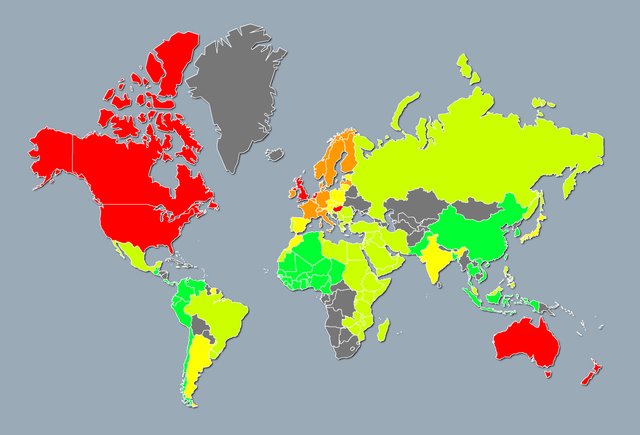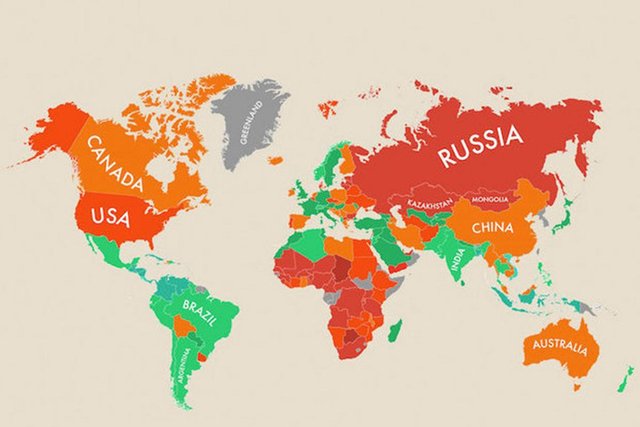National Culture - Individualism VS Collectivism around the World
"Individualism VS Collectivism" is one of the six dimensions of national culture proposed by Professor Geert Hofstede. The remaining five are:
- Power Distance Index: This dimension expresses how much the less powerful members of a society accept and expect that power is distributed unequally. This index shows how a society handles inequalities among its members.
- Masculinity VS Femininity: The Masculinity side of this dimension represents a preference for achievement, heroism, self-confidence, and monetary rewards for success. Masculine societies are very competitive. The Femininity stands for a preference for cooperation, modesty, caring for the weak and quality of life. These societies are much more consensus-oriented.
- Uncertainty Avoidance Index: The Uncertainty Avoidance dimension expresses what a society feels towards uncertainty. Some countries maintain rigid, traditional codes of belief and behavior, while other maintain a more relaxed attitude in which practice counts more than principles.
- Long-Term VS Short-Term Orientation: This dimension demonstrates how a society maintains links with its past while dealing with the challenges of the present and the future. Some societies value long-term (pragmatic) orientation, while other gear towards short-term (normative) approach.
- Indulgence VS Restraint: Indulgence stands for a relatively free gratification of basic and natural human drives related to enjoying life and having fun. Restraint stands for strict social norms and suppressed fulfillment of needs.
Out of the mentioned remaining five dimensions of natural culture, Masculinity VS Femininity is the most similar to the dimension that we are talking about today - Individualism VS Collectivism.

On the individualist side we find societies in which the ties between individuals are loose - everyone is expected to look after himself and his immediate family. In this idea, the individual has an absolute right to live it as he sees fit, to act on his own judgment, to keep and use the product of his effort, and to pursue the values of his choosing. Thus, the individual is sovereign, an end in himself, and the fundamental unit of moral concern.
On the collectivist side, we find societies in which people are integrated into strong, cohesive in-groups, which protect them in exchange for loyalty. Collectivism is the idea that the individual’s life belongs not to him but to the society of which he is a part and that he must sacrifice his values and goals for the collective (greater) good. According to collectivism, the society is the basic unit of moral concern, which sets the rules of behavior.
My personal opinion is that, like in almost all things in life and philosophy, it's important to find a balance. A completely individualistic society (total anarchy) would cause serious problems with protection from violent individuals as well as with the inability to conducts large beneficial community projects such as bridges, highways, or hospitals. On the other side, a completely collectivist society would turn us into slave robots serving the society. Thus, none of the extremes is good and the only question is on which side of the optimum are we today.

On the map above you can see the Individualism VS Collectivism scores around the globe. Red countries are highly individualistic, while the green ones are oriented towards collectivism. If we would judge quickly, we would conclude that a tendency towards individualism is good, since high individualism is generally found in the most developed parts of the world. But, hey, take a look at this:

That is the happiness around the world map, with happiness being defined as the ability to live a long, happy, environmentally sustainable life. While some highly individualistic and developed countries are also happy (most of the Western, Central, and Northern Europe, as well as New Zealand), other seem to be unhappy (USA, Canada, and Australia). On the other hand, although mostly poor, the countries of the Caribbean (ahoy, pirates) rank top in both collectivism and happiness scores.
As I already wrote in one of my past articles, I believe that wealth can secure most of our physiological and safety needs, but it can help little with our love and belonging, esteem, and self-actualization needs (these are five groups of human needs according to Maslow). What do you think is the best option for those three groups of needs that money can't buy - individualism or collectivism?
If you liked this post, then you would probably also like my recent article: Bystander Effect: What is it & What to do about it?
Have a wonderful day, week, and life!
I'd like the idea of collectivism, but the west don't like it, they will tag you as dictator country.
I agree with you, there are prejudices and historical preferences towards individualism/collectivism on both east & west.
P.S. I see that you have some interesting posts, I'll follow you. : )
I missed this in my feed when you originally posted it otherwise I would have upvoted it. My country is, Australia, is very red! But we also have lots of migrants from countries that are highly collectivist in these rankings. I see this play out everyday.
My sister in law is Taiwanese and in their culture it is expected that her parents will live with her when they are older. My brother, who is highly individualistic, is not supportive of this! I will get to see the clash of cultures play out in real life in about 15 years. If steemit is still around I’ll let you know how it goes 😂😂😂
Yes, all countries historically related to UK (UK itself, USA, Canada, Australia, New Zealand) are very, very red.
It's not uncommon in my country neither (Serbia) that children accept their old parents to live with them. You're actually considered somewhat rude here if you send your old parent to go to a retirement home, unless there's a very good reason for it (like, you're constantly on business trips so you can't be much with your parent anyway, or you parent has serious dementia or other problem that makes him/her dangerous for your own kids).
I'm looking forward to hear about how it played out for your brother and sister in law in about 15 years. 😀 😀
That comparison is quite interesting, because in 2010, just before the crisis began, Venezuela was ranked number 5 in a happiness survey, but today is very different, since it appears in the worst positions. So, having that personal experience, I believe that happiness in the countries of Central and South America is due to the fact that the collectivist countries can dedicate themselves to their social activities once they have their basic needs met, something that makes them happy. However, I believe that individualist countries tend to be more competitive and do not give happiness as much priority. People in individualistic countries tend to be results oriented, and to achieve goals, as a consequence, that is why they are generally classified as "less happy". In the case of the Nordic countries, I think that their happiness is due to the high quality of life indexes, and to a low density of population, Allan Pease in his books explained that in the cities people tend to be more hostile, since they tend to reduce your personal space, in places with low population density the opposite happens, personal space is expanded.
An excellent observation, totally in line with the Maslow's hierarchy of the human needs! In a way, people in individualistic countries tend to continue focusing on money even after their physiological and safety needs are well-met, thus failing to achieve a more complete/overall happiness (coming from love and belonging, esteem, and self-actualization).
Yes, the Nordic countries have very high culture standards in terms of liberty, justice, healthcare, free time, and similar, which is maybe why they manage to provide happy lives although they are relatively individualistic societies.
I like the explanation by Allan Pease. People in villages on average definitely have more serenity and less stress in their lives than those living in large, crowded cities.
Thank you for a meaningful comment, as always. Cheers! : )
Quite the contrary!Have you read the Gulag Archipelago? I mean you people are talking about what the socialists "can"do once they have thier basic needs met!and i don't understand your statement about individualistic countries being result oriented?are you familiar with the western conceptulaization of the indivual? the mesopotamian myths?
Hi @shery7, thank you for joining the discussion. It's important to differentiate between capitalism/socialism and individualism/collectivism. The first two are political systems, while the second two are extremes of a national culture dimension. A nation can have a capitalistic political system while having a cultural preference for collectivism, and vice versa.
It's the ideas that matter not the systems constructed on them.so my argument was collectivism is a attractive theory but shallow and when put in practice proves fatal (yes!im saying your happiness around the world map thingy is incorrect to say the least happiness is fleeting).The individual is responsible for his action and only his action and not the group.and if we study for the sake of the argument lets say psycologically the human history collectivism is nothing but a facade made up by materialists for the well being of humans(on the surface!)
So i'm "just" saying highly idividualistic societies do better but the lack of meaning due to the death of God is a big problem and it needs rectification
I'm not atteacking anyone i just love to discuss these things:)
I like the simple explanation and comparison that you made these systems. Equally, both positions have their ideological justifications in function of determining the social relations of symbolic or productive exchange.
Thank you. I agree, they both have useful elements that should be combined in an optimal way.
Interesting ideas, but I have never liked this dichotomy insofar as it suggests an 'us against them' mentality. Like, we are one way and you are another, so we lack common ground for rational discussion? No, that won't do! Not that I think that is what you are saying.
Actual communities are sui generis: each is unique. Different levels of social connection or cohesion may exist across many different areas of economic and social activity, forming many complex, interconnected networks that have a real history that played out on the world stage.
Any particular connection or set of connections can be criticized on many grounds, but how ‘individualistic’ or ‘collectivist’ may not be very helpful. Indeed, you evaluate these two based on happiness levels, which is an indicator, but the dichotomy is too simplistic to support one over the other. Even if one could be said to be inherently better at producing happiness (which is unlikely), trying to impose that inorganically on another society is a recipe for disaster (as we see in American foreign policy!). These things must (and ultimately will) develop organically, with or without interference.
Community is important. It is important to have solid social networks. But communities cannot legitimately request major sacrifices from their members, and even the pressure to do so can be seen as despotic. We exist as individuals, and a community that fails to recognize this cannot persist.
But as I said, this is all very complicated, with so many dimensions. You mention individualism/collectivism as one of six dimensions, but there are many dimensions/variables within each.
Think about the importance of history and culture, and the role that these play in supporting or precluding one or the other, temporarily or for good, or in forming some particular hybrid.
And technology! Cryptocurrency offers a future with decentralized institutions — a libertarian (and thus individualist) wet dream. But at the same time, bitcoin (etc.) is a network of many people around the world: it is a collective, a community, and it is this collectivity that has sparked this libertarian revolution. Our large, centralized institutions have separated us into individuals, with narrow, limited communities. The freedom and openness offered by decentralization offers great promise for the building of new social networks — new collectives.
In any case, I think the dichotomy is useful and I enjoyed your article, but it would be better if you followed up on your comment below, regarding potential ‘optimal combinations’.
Thank you for the thoughtful comment, @theperipatetic, I'm glad you enjoyed the article!
I completely agree with you on dichotomy - as I mentioned, think that none of the extremes is good and that the point is to find an optimum between them.
I also agree that when one nation aggressively imposes its cultural norms on other nation(s) it usually ends up bad.
It is indeed impossible to link individualism/collectivism with happiness in general, but the comment above made by @vieira and my reply to it may interest you. : )
I believe that the idea of collectivism is beyond the material goods. After Einstein's general theory of relativity is now proven than there is no distance that separate us, the whole universe is united. So living for yourself and your nearby is something that is against the truth of the universe and so away from the truly happiness.
I like to think that our individual lives are just parts of a much bigger life – evolution. We are distant relatives to all forms of life on our planet, including monkeys, wolves, whales, dolphins, flowers, and trees. The life as a whole, as the evolution, as the ecosystem whose part we are, continues long before and after our individual “death”. Thus, we are a little bit of everyone, human, animal, and plant alike, and we all contribute to and enjoy a bit of the ongoing, uniform life.
How appropriate is it to frame the discussion being collectivism vs individualism? These are inerasable traits of the human experience.
They typically do not contend with one another; the individual is a byproduct of the collective and exists to (re)vivify the collective; it is inherently circular.
The point of the argument should therefore be, to what extent do we hone our concerns, where as you stated, the moral concern. I don't think choosing to frame morality under the individual deters the legitimacy of the collective for the very reason I stated; the two are interlocked. However, it should be said that our interactions are under an individual basis, not collective - only when the question of groups interacting with groups do we abstract from the individual person to the individual group.
If we appropriately categorize where the premise of an argument lies, where collective or individual becomes a concern, then there really isn't a problem.
Hi @mikon,
I agree with you that collectivism and individualism are highly interconnected. As I've mentioned, I think that the point is to find an optimal balance on the individualism/collectivism dimension of national culture.
Yes, our interactions are most usually under an individual basis; however, being part of a group can significantly alter our behavior, with the Bystander Effect being one of the examples.
Thank you for commenting.
This post received a free Upvote. Get your free Upvote NOW! Just follow @freeupvote
Thank you (although I'm not following you).